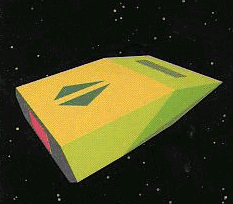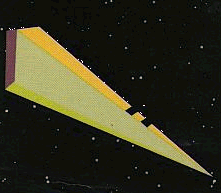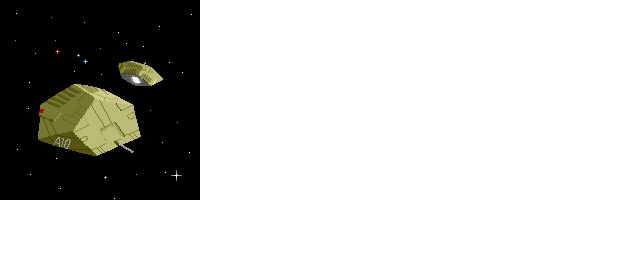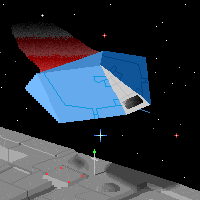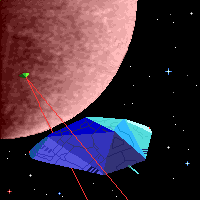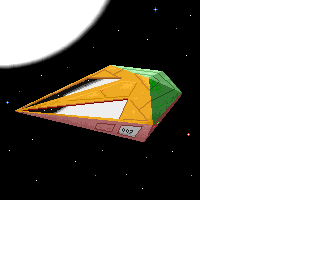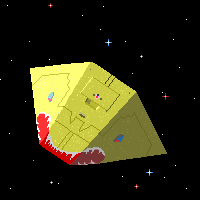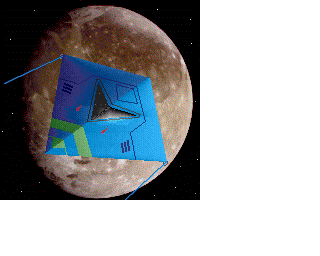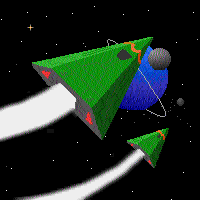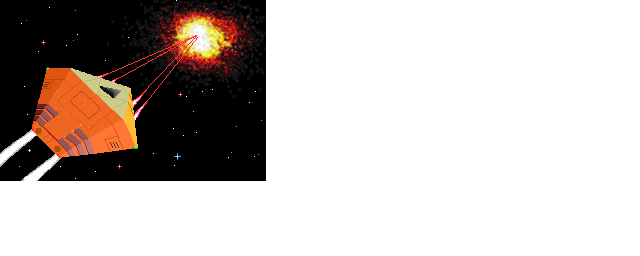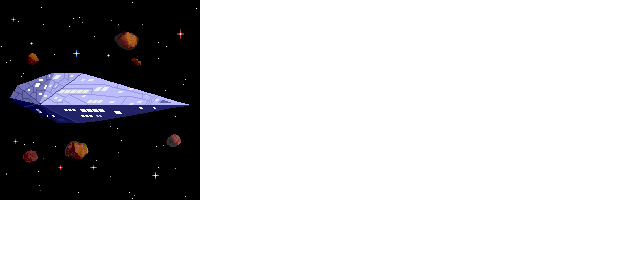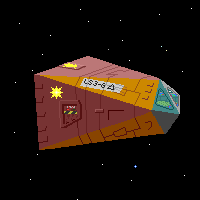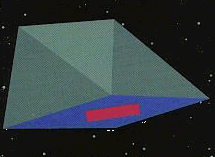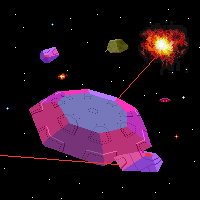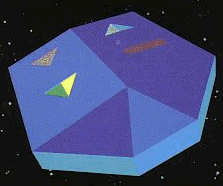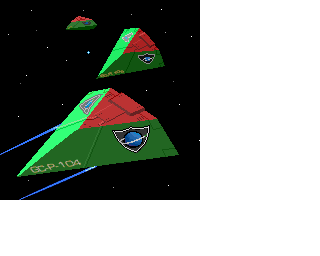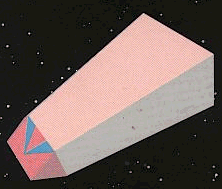INTRODUCTORY DATA
Welcome aboard this Cobra Mk III trading and combat craft. The ship has been supplied to you by Faulcon deLacy Spaceways, by arrangement with the Galactic Co-operative of Worlds whose Space and Interstellar Pilot's Exams you have just successfully completed. The small flight manual supplied with the craft is designed to familiarize you with all aspects of space flight, combat and trading, and we hope that it will be of use to you.You begin your career, your ship equipped with a single forward-firing pulse laser, 3 homing missiles, 7 light years of fuel, and the sum of 100 Credits (CR), ready to embark from a space station in orbit around the planet Lave.
The Cobra Mk III is the best of the medium-range, medium capacity fighter- traders, and is an ideal ship for new traders intent on building their fortunes, or new combateers who will constantly need to finance the cost of both armaments and non-combative equipment.
The ship is highly maneuverable, has a good C-holding factor during hyperspace transit, can hold sufficient Quirium H-fuel for a 7-light-year single jump and has full Auto Trading Systems Link for use at space stations. Further, it is protected by Dual Zieman Energy Deflection Shields, powered by 4 energy banks, and has a powerful, rapid-fire pulse laser mounted on the forward hull segment. Flight controls and elegant and simple, and ThruSpace GravDistort communications systems. Its life support functions are varied and flexible to ensure maximum comfort during trading or hunting operations.
Pilot licences are issued only at the planet Lave, and it is likely, therefore, that you are now docked at a Coriolis station in orbit around that particular world. Lave is a rich, agricultural dictatorship, but is a reasonably safe world at which to begin your endeavors. GalCop and the Lave Authorities allow practice docking and departure runs to all their space stations here, and you would be advised to take advantage of this facility.
INTERIOR OF A COBRA MK III
The Cobra is essentially a single-pilot trade-ship, but has been designed to support a second person, provided that person is of ordinary human or humanoid dimensions and physiology. The ship itself consists of five main areas:THE CARGO HOLD fills the bulk of the mid-space area, and the cargo bay doors open downwards. The capacity in an unmodified Cobra is 20 1-tonne canisters. Extra cargo space may be acquired by extending the cargo bay, which does not affect maneuverability. Tonne canisters (TC) attach magnetically to the cargo arms within the bay, and 2 AutoShuttles occupy the central space.
THE BRIDGE has seats for pilot and co-pilot, a MedStim Center, entrance to the escape pod, descent well to living quarters, communications console, special suit locker, RemLock supply case, attachment facilities for AutoDock System and a hand-weapons locker. The main wall is occupied by the scanner screen, astrogation console and main systems monitors.
THE DRIVE SECTOR houses the directional thrusts, the System Space Kruger "lightfast" motors, and the Irrikon Thru-Space drives. Also here are the rear laser housings, the ECM capsule, the Zieman shield generators, and energy banks, and the Witch-Space fuel condensors (Quirium). There are both internal and external access panels. Radiation level is high.
THE LIVING AND HYGIENE SECTION is below the main bridge, and reached through a descending gravity well. Two bunks, food dispensing facilities, waste disposal (including high-tox copper exudate for Aonians), SynPleasure relaxapads, and videos.
THE EQUIPMENT LEVEL runs throughout the ship, and houses all energy banks for lasers, plus the missile rests, with dispatch shafts to the lower hull. The communications center is here, and the escape pod (with a separate entrance from the bridge) life support systems, cryogen tanks (two) and 40 cubic meters of FacsEnvironment for emergency use.
THE STATUS PAGE
The "Present System" refers to the planetary system which your ship is currently in; while the "Hyperspace system" refers to the system onto which the hyperspace is locked.There are 4 possible "Conditions": DOCKED means that you are docked in a space station at the Present System; GREEN means that there is no immediate danger; YELLOW indicates enemy ships in the vicinity; Condition RED signals a high-risk on-going death-type combat situation.
"Legal Status" refers to your Galactic Police record. If this is CLEAN you have nothing to worry about, but as an OFFENDER or, still worse, a FUGITIVE you are likely to be attacked by police ships.
The "Rating" is a dispassionate assessment of your performance in combat so far.
Current cash and fuel are also displayed, along with a list of ship fittings.
The status page is always retrievable by pressing F9.
 |
| Commander Jameson's rating is 'harmless' which is surprising when you consider the equipment and cash he has managed to amass. In fact as his status suggests this has been achieved with considerable business acumen |
YOUR RATING AS A COMBATEER
To become an elite combateer requires great skill and great patience, because expert trading is essential before the necessary more powerful armaments and equipment available to the Cobra ship can be bought: beam lasers, more missiles, energy bombs, a docking computer, galactic hyperdrive, etc.As you sail through space between the stars, and as you trade, you will live with your combat rating. You will begin as HARMLESS. If you survive your first skirmish you may be reclassified as MOSTLY HARMLESS. But on the slow climb to a status level that reflects a growing talent for combat you will have to engage many different ships, in many different skirmishes, in the System Space of many different worlds. You will be classified as POOR, then AVERAGE, then ABOVE AVERAGE, then COMPETENT. Then you will become DANGEROUS, then DEADLY. An at last, a few will become ELITE.
Your kills are photographed and transmitted by TS ComDirect to the nearest GalCop Federal Law Center. Your rating as a combateer will increase in direct proportion.
Fly your Cobra craft wisely and carefully. Remember: other pilots may be attempting to increase their own combat rating by attacking either innocent traders, or police Vipers (the ships of the GalCop Police Force). If you resort to such tactics (or if your adopt the fast-credit routine and trade in illegal goods) then your combat rating may rise, but your legal status: CLEAN -> OFFENDER -> FUGITIVE, will make you Public Enemy Number One with the Federation Crime Monitoring Authority and you will not be left alone.
| KEY FUNCTION - STATUS | |
| F9 | Status page accessed by pressing F9 |
NAVIGATION AND FLYING
NAVIGATION
The Galactic Co-operative is only one - although the largest - of several planetary federations, and maintains trade and diplomatic links with over 2000 planets spread throughout 8 galaxies. The political profile of a planet is an important navigational consideration as many are in a state of anarchy and are unsafe to visit in poorly equipped ships. Important too is its economic profile, as will be discussed in the section about trading.Navigational strategy depends of course upon your aims in life. If you think you have what it take sot become elite, you will need to chart your path through the galaxies with care and great precision. You will wish to equip your ship as fully and as early as possible. You will, therefore, need to study the trading section of this manual so that you can work out a profitable trading route in order to be able to afford the weaponry you will require. You will wish to lead; in general, the more risks you take (travelling to dangerous planets or trading in contraband goods), the faster you may equip your ship but the quicker you will be killed. You will discover that life in the 8 galaxies is a question of fine balance. Although it may seem, at first, that indiscriminate carnage is a soft option (kills improve your rating, after all), as your skills and experience of living in space mature, you will quickly discover that piracy is a short-lived career.
Success in this context is a mosaic of talents: combative, certainly, buy thinking and decision-making talents too.
Here you are introduced to all the controls which will eventually be useful to you in developing a route through the 8 galaxies.
NAVIGATIONAL CONTROLS
It is important that you do not press the F1 key for the moment. SSS GALACTIC CHART (F5). This chart shows all registered worlds within the galaxy, and indicates your own coordinate position. The star cursor may be used to scan the shown worlds for potentially favorable trade sites.Use the joystick, mouse or cursor keys to move the small cross over to one of the dots, and hit F7.
WORLDATA LINK. The Orbit Space Authority takes no responsibility for the accuracy of the information registered here, but the trader may gain some idea of the relative wisdom of trading with the world whose data is displayed. The information shown is distance, type of main life form, degree of agricultural or industrial development, with industrial and technological level displayed on a scale of 1-12. The government type, ranging from Corporate State to Anarchy, will be a strong indication of the danger of trading with the system.
Use F5 again to return to the chart and acquire information about some more planets.
The larger of the crosses on the chart shows where your ship is and the circle shows how far it can jump with its current hyperspace fuel.
Hit B key to return the small cross to the larger one.
LOCAL NAVIGATION CHART (F6). This is a high power chart of all planets in the immediate vicinity of your docking world. Since the Cobra ship has a maximum single H-jump range of 7 light years, the target world must be chosen carefully. The target cursor, used in conjunction with the Worldata link, will indicate dangerous or likely worlds for trade. If the cross moves off the screen, use the B key to bring it back. Notice also that the D key will tell you how far away the system nearest the small cross is.
| KEY FUNCTION - NAVIGATION | |
| F5 | Galactic chart |
| F6 | Local chart |
| D | Distance to system |
| B | Retrieve cursor cross |
| F7 | Data on system |
| Cursor keys | Cross-sight cursor for local and galactic systems |
A CORIOLIS SPACE STATION
Every world registered with the Galactic Co-operative has several Coriolis space stations in orbit at various altitudes. Coriolis stations are "neutral" territory, controlled equally by GalCop and the Planetary Government.A new dodecahedral design (the so-called "Dodo" stations) is replacing the Coriolis design in the more advanced systems. Coriolis stations are hexagonal in approximate shape. They spin along a single axis running vertically from the planet below. One side of the station always faces the planet, and it is on this facet that the access tunnel is located.
Coriolis stations were designed at the GASEC (Galactic Astronautic and Space Exploration Center) Laboratories on the planet Vetitice. The first station was in orbit around the world Lave in 2752.
Coriolis stations have powerful defensive shields (against pirate attack and inept docking) and a large fleet of Viper fighters, and several larger types of ship. The inside of the station is free-space, and on each inner facet of the station there are berthing and refueling facilities, as well as cities, hospitals, farmlands and leisure-scapes.
Each Coriolis station has a diameter of 1 standard kilometer. They can berth 2000 ships, and support a fair-sized colonial life development of humanoids.
LEAVING THE SPACE STATION
On coding for Station Depart the pilot is advised to accept a 10-second MemnSomn to dispense with subjective experience of the passage from docking bay to Coriolis station egress. The screen will then show a break-pattern, which is the passage through the protective field over the Coriolis entrance tunnel. SubSub BASIC MANEUVERS The Cobra trade ship needs practice to fly well, though it is highly maneuverable, very fast, and a good combat vessel. It accelerates and decelerates rapidly using fingertip control:| Anticlockwise roll | < , joystick or mouse left |
| Clockwise roll | > , joystick or mouse right |
| Dive | S, joystick or mouse forward |
| Climb | X, joystick or mouse back |
| Increase speed | SPACE or hold right mouse button then forward |
| Decrease speed | / (slash) or hold right mouse button down then back one |
| Cancel roll | press on right mouse button |
Pitch and yaw maneuver requires bi-digital play on keyboard model (<,>,S,X)
Notice the small dot moving around inside the large circle on the dials. This is your compass; the dot corresponds to the position of the space station. If the dot is small then the station is behind you. When the dot is large and in the center of the circle, you should be able to see the space station directly in front of you.
Practice rotating the space station off the screen and using the compass to find it again.
You might see some Cobra Class ships. These are other traders like yourself, and will not harm you unless you shoot at them. If you do this they will either attack or, alternatively, run away. Should you use them for combat practice, do not expect the space station to turn a blind eye to such unruly behavior. Nothing will attack you while you are within sight of the space station - unless you make a nuisance of yourself.
It is not possible to land on the planet, and flying into planets or space stations is fatal. The altimeter shows your height above the planet's surface, and you should not let it fall too low.
(If you are a new pilot, now is your best chance to practice docking maneuvers with the space station at Lave. The Lave Orbit Space Authority permits an unlimited number of practice runs by newly appointed pilots, and does not charge. This facility is suspended during attack, or when the Coriolis station has no free docking space.
CONSOLE READINGS
(bars to the left of the flight grid scanner)- (FU) Fuel level.
- (CT) Cabin temperature will increase and the console register this when your ship flies too close to a sun.
- (AL) Altimeter. You altitude above your destination planet can be crucial. Flying too near its surface will be fatal. (flight grid scanner)
- (x1 - upper left corner of scanner) Radar Magnification.
- (S) S refers to the space station and indicates that you are on target for it and within its protective range.
- Compass (upper right corner of scanner). This instrument first picks up a target planet while it remains out of range of the main flight-path scanner. When the planet's space station nearest to you comes within range of it, the compass picks up that instead. When the dot is small, the object is behind you; when large and in the center of the compass circle, it should be visible through your front viewfinder.
- Flight grid scanner. This sophisticated instrument displays a three- dimensional view of space in the immediate vicinity of your ship, seen from a point behind and above it. The precise position of any ship within its range can be pinpointed. (bars to the right of the flight grid scanner)
- (SP) Forward velocity should be maintained at maximum on planetary approach. Keep it low during space station approach, and minimal for final docking.
- (RL and DC) Gyro orient bar indicators show right/left roll and dive/ climb status.
MAKING FOR YOUR TARGET WORLD
Hyperspace and Related Controls
Having left the space station you will be in low orbit above the planet Lave, moving at low velocity. Decrease your velocity to absolute minimum before coding the astrogation console for Hyperspace Jump.During space flight only, F1, F2, F3, and F4 provide access to views all around your ship.
Use F5 or F6 to display a chart (galactic or local, respectively), and move the smaller cross to choose a larger planet, press F1, then hit H. After a short delay, the hyperjump motors will engage.
On arrival in a new planetary system, after transit from hyperspace, you will find yourself at some distance from your target world. This conforms with GC Flight Law.
Even in the safest systems there can be unseen dangers, and you will be well advised to approach orbit space, and the safety of the space station, as quickly as possible. Increase forward velocity to maximum. At this point you can take full advantage of the space-skip facility (J). Inter- space jumping does not function (because of interference patterns) if there is another ship, a planet or a sun in the immediate vicinity.
Soon your ship's computer will pick up the beacon signals of the nearest orbital space station and will re-engage the compass to track that instead of the target planet. Once the Cobra is within scanning and protective range of the Coriolis station, the flight-grid scanner will begin to track it. Its own defenses are now available for your protection. The scan console will register the letter "S" as long as the space station is within range.
Hyperdrive Across Galaxies
The intergalactic hyperdrive is expensive and can be obtained only from planets at Tech level 10 or higher. It can only be used once, and will take you to a system in a whole new galaxy (i.e. a new F5 map). There are 8 such galaxies and making 8 jumps will return you to your starting galaxy. The Inter-Galactic Hyperdrive is engaged by pressing G then H.
DOCKING PROCEDURE
Docking with a Coriolis space station is never easy, unless the ship is equipped with an automatic docking computer (in which case C will activate it). The Navy Training Manual recommends the following approach and dock sequence.Locate the Coriolis station and approach it. The entrance tunnels to all these stations face the mother planet. Fly near to the station and then on towards the planet (monitoring altitude carefully). By turning a half circle you will now find your ship orientated towards the entrance.
Approach the final moments of docking at DEAD SLOW SPEED. Failure to dock cleanly can be fatal but may simply result in your scraping the sides of the aperture, with consequent loss of defensive shield(s) and quite possible your cargo. Manually control the Cobra's roll motion to match the rotation of the Coriolis station. The entry port must be as nearly horizontal as possible.
If docking is successful; the protective field across the station entrance is penetrated, and a break pattern appears on the screen. Berthing is handled automatically.
Docking protocol, and Orbit Space Regulations, are numerous, and are available in the GC Orbit and System Space Code, published by Federation Planet Bureau.
| KEY FUNCTION - FLYING | |
| F1 | Launch |
| SPACE | Increase velocity |
| J | Space skip |
| / (SLASH | ,Decrease velocity) |
| < | Counterclockwise roll |
| > | Clockwise roll |
| S | Dive |
| X | Climb |
| G then H | Inter-galactic hyperdrive |
| C | Docking computer toggle on/off |
INTERPLANETARY TRAVEL
IN-FLIGHT COMBAT:
COMBAT PROTOCOL
Not all ships in deep space, even small fighters, are pirates. Most ships will respond to hostile action with hostile action. If you attack a police ship or trade in contraband goods (see Trading), your legal status will be changed to OFFENDER, or even higher. If you destroy pirate ships, or Thargoid invaders, (or asteroids) you will receive a bounty payment. If you shoot at the Coriolis space station, its own defensive ships (Viper class fighters) will attack you.MANEUVERING
The Cobra tradeship is fast, and has a very tight turning circle (though less tight at full speed); it is an ideal combat ship against small packs of enemy vessels. It will outrun many attack craft by speed alone, but it will not outrun a missile. Spinning, fast-slow, and duck-and-weave maneuvers are very effective against the larger, less maneuverable ships when then attack. A sudden decrease in speed followed by a tight 180 degree turn and an increase in velocity will often give you a big advantage over pursuing enemy craft. |
| You must be prepared to outwit your enemies. Speed of reaction will not in itself always be enough. |
SIGNS OF DANGER
If you cannot make an interspace quick jump J towards the planet, there is a ship in the vicinity. It could be dangerous.If the status screen, during flight, shows YELLOW or RED, prepare to engage in combat.
Laser fire striking the defensive shields makes a light screeching sound. Listen for laser fire striking the hull direct. Through damaged screens it makes a low, screeching sound. DANGER.
An incoming missile will be detected, tracked, and a warning message flashed on main screen.
Some star pilots are braver than others and pirate ships may break off and run in the face of stiff resistance. Some appear to know no fear - in particular Thargoid vessels, whose captains have had their fear glands surgically removed.
LIKELY ENEMIES
Lone-wolf traders - such as Cobra pilots - are constantly at risk from other Spacefaring types. An understanding of other loners, packhunters, and bounty killers is essential.
Bounty Hunters Unless you have achieved FUGITIVE status, and especially if you are highly ranked as a combateer as well as being a criminal, bounty hunters will not bother a ship as insignificant as a Cobra Mk 3. In fact, many bounty hunters favor Cobra trade-ships as they make an excellent disguise. But the real killers star-ride in the sleek, and highly efficient, Fer-de-Lance Lightspeeder, in which they live for months at a time. Bounty hunters can always be found outside Orbit Space, especially around worlds classified as "dangerous". They are invariably of combat rating: DEADLY or ELITE. Bounty hunters rarely identify themselves to passing ships, and if pestered too closely will usually kill.
Pirate Vessels There are several ways of identifying a space-going ship as " pirate occupied ", and this is essential since pirates and renegades will take any ship for their purpose, from a Worm to a massive Python. Pirates exist everywhere in the galaxy, but cluster mainly around unstable GalCop worlds, especially worlds run on a feudal or anarchic system.
Small ships hovering very distant from a planet are pirates. Large ships accompanied by a mixture of small fighter types are pirates. Ships that refuse to acknowledge identification signals are pirates. Around worlds run by autocracies, or clans, pirates will very often have been paid to leave trade ships alone. Piracy is a huge, and complex, business, and any life-respecting trader will learn the tell-tale signs of pirate presence.
Police In a Co-operative of Worlds as complex as the 2040 planets f the GalCop, the police can be as menacing as they can be helpful. The typical police vessel is a Viper GH Class PulseShip, which is very fast, and very maneuverable. They are on constant standby on every Coriolis and Dodec space station, and will attack - a pirate, or a fugitive trader - within seconds. They do not make arrests, they destroy. There are different police departments serving different purposes - narcotics, space- drunkenness, psychotic shooting, piracy, slave trading, etc. - but all have small fleets of these very fast Viper patrol craft.
Thargoid Invasion Ships and Thargons The Thargoids are humankind's deadly enemy, and throughout the 8 galaxies there are at least 50 war zones between humanity and Thargoid. This highly technologically advanced insectoid race is also at war with 17 other space- going life-forms.
All Thargoid combateers are ruthless in combat, and some may be comparable with elite-status human combat pilots.
Though most of the Thargoid Space Fleet is currently engaged by the Galactic Navy in InterGalactic Space, a few of the smaller battle ships make occasional destructor-raids into human space. These ships are extremely fast for their size and invariably have anti-missile (ECM) Systems.
Additionally, most Thargoid battle ships carry several small, remote- controlled "thargons", killer-craft each equipped with a single, but highly advanced, pulse-laser. The Galactic Navy are developing their own deep- space RemCraft, and pay a large bounty for any thargon craft that are brought to them.
(N.B. Bounty on Thargoid invasion craft destroyed is very high. Thargoid battle-cruisers believed to be able to "hover" in Witch-Space (hyperspace) and destroy through-coming craft).
OTHER SPACE TYPES
Rock Hermits Pirates, aging bounty hunters, or planetary outcasts, who create living space out of asteroids. They usually choose large asteroids, and set up signal beacons to warn off miners. GalCop Law protects Rock Hermits, but since most of the asteroid is hollowed-out, there is little advantage to be gained by "mining" them anyway.
Generation Ships Before the development of the WS Thru-Space drive, in all its various forms, interstellar travel occurred in large, self-sustaining environment ships - Generation Ships - most of which have now been logged and their progress monitored. There are more than seventy thousand of these immense vessels ploughing their way through the galaxy, some of them into their 30th generation. The penalty for interference with such a vessel is marooning.
Space Dredgers These immense factory ships are to be found wherever there has been a war, or a Thargoid invasion, or a natural catastrophe. More than forty miles long, the dredgers are a life-form to themselves. The Dredgers are huge cities in space, feeding off debris and ruination. Heavily armed, and with fleets of reconditioned fighter ships, they are to be avoided at all cost.
COMBAT CONSOLE
(bars to the left of the scanner)- (FS & AS) Defensive shields take power from two energy bank sources, fore and aft.
- (missile) Missile status depicts the number of missiles on board and whether they are "targetted" (purple) or "untargetted" (green) or " locked and ready to fire" (red).
- (LT) Laser temperature will rise during continuous firing of the ship's laser(s). As the central housing overheats, a laser will temporarily cut out rather than destroy the system. (flight grid scanner)
- The 3-dimensional scanner operates in such as way that you can pinpoint a ship above and below yours, as well as to the front, behind or to the sides. The vertical bars show this clearly. (bars to the right of the scanner)
- (1,2,3,4) Energy banks will rapidly drain if defensive shields are taking excessive fire. Using lasers or an ECM System will also drain their resources. When the fourth bank is tapped, an ENERGY LOW message will flash onto the screen. Eventually, in normal circumstances, the banks will be automatically replenished by surface radiation absorption.
AGRESSIVE WEAPONRY
| ITEM | TECH LEVEL | PRICE/CR |
| Fuel | always | varies |
| Missile | always | 30 |
| Large Cargo Bay | always | 400 |
| ECM System | 2 | 600 |
| Pulse Laser | 3 | 400 |
| Beam Laser | 4 | 1000 |
| Fuel Scoops | 5 | 525 |
| Escape Capsule | 6 | 1000 |
| Energy Bomb | 7 | 900 |
| Extra Energy Unit | 8 | 1500 |
| Docking Computers | 9 | 1500 |
| Galactic Hyperdrive | 10 | 5000 |
| Mining Lasers | 10 | 800 |
| Military Lasers | 10 | 6000 |
LASERS
Pulse lasers are initially housed only in the front of the ship, and so no sights appear across rear or side views until such time as you have sufficient credits (from combat and trading) to afford lasers for these mountings. As we shall see, with sufficient cash you will also be able to upgrade pulse to more powerful beam lasers.The Cobra astrogation console accommodates a single laser-fire key (A). Pilots with joysticks use the fire button of course. Even fully equipped only one laser may be fired at a time. If a laster overheats it will not fire (observe the laser temperature bar).
Lasers are the principal armament of all space fighters.
Pulse lasers will be offered for sale at planets of Tech level 3 or above (see Trading). Beam Lasers will be offered at Tech level 4 or above. If a beam laser replaces a pulse laser the price of the pulse laser is refunded after the beam one has been fitted.
Pulse Laser Specification: Ingram Model 1919A4 Pulse Laser is recommended for all positional laser mountings, but is especially effective for rear-shooting. Fires intermittent laser "rods" 610mm in length, with a cycle rate of 1500 RoPM. The barrel is of high grade Allutium fiber, lined with tempered QuQorian Silica. Power provided directly from inverse energy banks contained in main ship's drive. Each rod is capable of piercing 267mm of Flux-Locked metal.
Beam Laser Specification: Ingram Model M1928A2 is highly recommended for front shooting. beam lasers fire continuous laser strands, up to 150 in parallel. Barrel is Allutium + lined with tensioned plastiglass, and as with the 1919A4 Pulse laser, power is provided by main drive link. Beam lasers are capable of slicing through 410mm FL metal.
Military lasers are the very height of sophistication. Costing fifteen times the price of a pulse laser and available only on planets at Tech level 10, it is an extremely effective piece of hardware. (See also Mining lasers under Non-Combative Equipment)
Military Laser Specification: Range and penetration twice as effective as the Ingram Model M1928A2 beam laser. This is Lance & Ferman's entre into the laser market. Hitherto known for their highly effective and relatively cheap missile systems, in the military laser they have in effect created a whole new laser market. The LF90 is the current computer-aided model and comes with x4SUSAT sights.
MISSILES
Missiles are always available, whatever the nature of your destination world, though no more than four may be carried at any one time. They are extremely effective weapons and are carried by the larger star ships. Your ship's computer will warn you when one is fired at you with a message on- screen. Unless your ship is fitted with ECM (see below) you will have to outmaneuver the missile, which will home in on you relentlessly. If a missile hits you, it can almost completely exhaust a fully charged shield and, if your shields and energy are low, may well be fatal.Before a missile can be fired it must be locked onto a target. When fired, it will home in on that target and destroy it, unless your enemy successfully takes on of the precautions described above. The missile launch mechanism is very reliable and hardly ever jams. Missiles can be locked onto targets in any view (F1, F2, F3 or F4).
The targeting sequence is engaged by hitting the T key. The square missile status indicator on the astrogation console will then turn purple. When any possible target enters the cross-hair region the missile will lock onto it, the missile status block turning red. A beep will sound to inform you of this.
Pressing the I key switches on the ship ID computer. This computer will tell you the class of the next enemy ship to pass in front of your cross- hairs, and then it will automatically Lock a missile onto that ship.
The M key will then fire the missile. The U key (Unarm) will abort the sequence at any time before firing.
Missile Specification: Lance & Ferman Homing Missiles (4x4) are now recommended for all small class trade-combat ships, but can be fitted as part of a mixed design weapon rack. LF missiles have 2IL-135 guidance systems, and optional manual directional control overrides. Warhead packed with Terminal 9 explosive, and the 4x4 is invulnerable to all known counteraction, except ECM systems. Capable of Megazon Destruct Force 7. Prototype first used in 2987, during Ineran Wars.
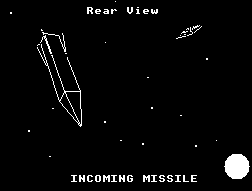 |
| Readily available and relatively cheap at 30 credits missiles are extremely effective weapons. T targets a missile when an enemy is in your sites (a bleep confirms this). F will fire it. U will unarm it. In the picture this ship's energy banks are about to be substantially reduced. |
ENERGY BOMBS
An energy bomb will be offered for sale at a planet of Tech level 7 or higher, and can be used only once. It is activated by the TAB key and will destroy all other ships, asteroids, and missiles in the vicinity.Energy Bomb Specification: Medusa Pandora Self Homing Energy Bomb (available at Tech Level 7 worlds or higher) is a tactical weapon capable of Megazon Destruct Force 13. Has heat radius of 900 km. Developed by Klaus-Kline laboratories for multi- role combat using "launch-and-leave" techniques.
DEFENSIVE MEASURES
SAFETY ZONE
The Orbit Space around any Coriolis Space Station is safe. The Stations own defences will come to your immediate assistance. Entry to safety zone is signalled with a large "S" on the astrogation console.SHIELDS AND ENERGY BANKS
You ship comes equipped with fore and aft shields and energy banks. The shields protect your ship from agressive fire, and will be recharged from the energy banks. Constant fire will harm the shields. Once a shield is depleted, enemy lasers and missiles striking that shield will take energy directly from the energy banks and may even destroy items of cargo or ship fittings. When all your energy banks are empty your ship will be destroyed. Using lasers or an ECM system will also deplete your energy banks.The ship's computer will keep you informed of any damage to your ship and will also warn you when energy levels are dangerously low.
An Extra Energy Unit may be fitted at planets of Tech level 8 or higher, and doubles the energy bank replenishment rate. This is the energy unit with the copper colored top. No other unit looks like it, or lasts like it.
Defensive Shield Specification: The shields consist of hi-tense flux webs of Zieman-charged sub-particles. They are weakest where the laser and missile tubes pass through the ship's hull, and along the central ship bank where the two shields overlap, and cause a stress zone.
ECM
An ECM System (literally Electronic Counter Measures System) is offered for sale at Tech level 2, and may be used any number of times given sufficient energy replacement. When activated by the E key, ECM destroys all missiles in your vicinity - including any that you have fired. Some enemy ships, especially traders, will have this and may use it against your missiles. Your ship's computer displays an E on the console when it detects ECM broadcasts.Anti-missile (ECM) System Specification: Radiant-Magnetic "wipe-out" using ion-saturation theory developed by Bell and Braben on riedquat 359. Electronic Counter Measures Systems use minute charged particles of InterSpac heavy Element dust, releasing their radiant energy and setting up expanding nuclear flux chains.
ESCAPE CAPSULE
An escape capsule can be fitted in place of your cabin at any world of Tech level 6 or higher. If Q is then hit during combat the capsule will be jettisoned from the ship, be automatically tracked by the nearest world and will travel safely to a Coriolis space station. Your cash will be preserved but all your cargo will be lost.However, this item comes with a widely recognized insurance cover which will guarantee you a new Cobra Class ship, equipped in like manner. The contents of the cargo hold is exempt from this protection.
Since the unique IR signature of a ship's hull is used to file police records, abandoning your ship in this way will have the effect (unfortunately exploited as much by galactic brigands as trader victims) of clearing your police record.
You may see an escape capsule leaving an enemy ship. This will not harm you unless you crash into it.
Escape Capsule Specification: Recommended model is the Xeesian FastJet LSC 7, which can support two human life-forms for seven weeks, in moderate Suspended An.state.
NON-COMBATIVE EQUIPMENT
FUEL
Fuel is always available. You can refill your tanks to full (7 light-year) capacity - no less is permitted.FUEL SCOOPS
Fuel Scoops may be fitted to the hull at a planet of Tech level 5 or higher. These enable a ship to obtain free hyperspace fuel by " skimming the sun " - flying close to it at high velocity.Since fuel scoops utilize powerful electro-magnetic fields to guide the solar winds into their converters, they may also be used to pick up miscellaneous space debris. Almost all pirate vessels are fitted with these so that they can blast their prey apart and sift among the wreckage, rather than attempt to dock with a hostile craft.
Once fuel scoops are installed, you can scoop up an object (such as a cargo canister) by keeping it in the lower half of the screen view areas while flying right up to it.
Fuel Scoop Specification: Fuel scoops are considered an essential for Deep Space, and dangerous zone trading. They have a standard design, and a standard fitment. They use powerful electromagnetic fields to guide solar wind or small space debris into their ReQax convertors.
CARGO BAY EXTENSION
One cargo bay extension can be bought, increasing the hold space from 20 to 35 tonnes.Cargo Bay Extension Specification: Standard model is the Mariner Freight Chamber.
DOCKING COMPUTER
This is available from all Tech level 9 planets; they are fitted to the ship's flight control system and enable it to dock the ship automatically. The auto-docking sequence is triggered by the C key and switched off by pressing C again.Docking Computer Specification: The SinCorn RemLock D&A System is a sophisticated and expensive piece of gadgetry. It comes with MemnSomn pilot interaction to induce hi-cram sleep during the maneuvers.
INTERGALACTIC HYPERDRIVE
The intergalactic hyperdrive is obtainable only from planets at Tech level 10 or higher, and can only be used once. The Inter-Galactic Hyperdrive is engaged by pressing G then H.IGH Specification: although a number of manufacturers have supported a whole range of IGH motors, it is recommended you remain loyal to Xexor/Hikan who provide the standard hyperspace transit drives.
ASTEROID MINING LASERS
Asteroid mining involves the fitting of fuel scoops and special mining lasers to your ship. Ships which always carry them are known as "Belters". They search for asteroids and, on finding one, use the laser to fragment it into pieces sufficiently small to be taken into the cargo bay.Mining Lasers Specification: Kruger Model ARM64 Sp. Mining laser is highly recommended as both a trade and combat addition. Uses variable frequency laser rods of 200mm length, fired in wide beam, 100 channels/beam. Automatic debris-pattern lock ensures no fragments of large size of target asteroid impinge on ship space. can be fitted with a fuel and matter scoop.
| KEY FUNCTION - COMBAT | |
| A | Fire laser |
| T | arget missile |
| I | Ship ID computer |
| M | Fire missile |
| U | Unarm missile |
| E | Operate ECM |
| TAB | Launch energy bomb |
| Q | Launch escape capsule |
| F4 | Equipment acquisition |
INTERGALACTIC TRADING
The Cobra Mk III, designed primarily as a trading ship, combines combat efficiency and maneuverability with substantial cargo space (20 Tonne Canisters) and with scoop attachments for space debris, jettisoned cargo and space rock.Most space stations have made the process of trading very simple, in order to facilitate a fast turnover in goods and ships. Import and export tariffs - which are high on some worlds - are automatically added or deducted and this is reflected in the prices shown. The auto-trader system, employed by the Cobra, does not allow for more specific trading deals to be performed.
A selection of the more valuable alien items that are tradeable is given in this manual, but the trader must deal with them in person.
Once docked you are linked directly with the CorCom Trade System. At your request you can obtain a list of basic trade items available for purchase.
Slaves are measured by the tonne in galactic trading. This may seem a little strange, but it includes the cryogenic suspension system necessary to keep them alive during space travel. The slave trade, once almost eliminated by the Galactic government is now returning, despite the efforts of the Galactic Police Force to suppress it.
| ITEM | AVERAGE PRICE/CR | ||
| Food | (Simple organic products, see below) | 4.4 tonne | |
| Textiles | (Unprocessed fabrics) | 6.4 " | |
| Radioactives | (Ores and by-products) | 21.2 " | |
| * Slaves | (Usually humanoid) | 8.0 " | |
| Liquor/Wines | (Exotic spirits from unearthy flora) | 25.2 " | |
| Luxuries | (Perfumes, Spices, Coffee) | 91.2 " | |
| * Narcotics | (Tobacco, Arcturan Megaweed) | 114.8 " | |
| Computers | (Intelligent machinery) | 84.0 " | |
| Machinery | (Factory and farm equipment) | 56.4 " | |
| Alloys | (Industrial Metals) | 32.8 " | |
| * Firearms | (Small-scale artillery, sidearms, etc) | 70.4 " | |
| Furs | (Includes leathers, Millennium Wompom Pelts) | 56.0 " | |
| Minerals | (Unrefined rock containing trace elements) | 8.0 kg | |
| Gold | 37.2 kg | ||
| Platinum | 65.2 kg | ||
| Gem-stones | (Includes jewelry) | 16.4 g | |
| Alien Items | (Artifacts, Weapons, etc) | 27.0 tonne | |
| * These items are defined as illegal by the Galactic Government, so trading in them is risky. | |||
F8 activates a list of basic trade items at current market prices.
Shown on this list are the quantities of each item available (vertical bar to the right of the item), and the current market price per unit. Most CorCom Trade Systems deal exclusively under blanket categories, including Food, Machinery, Minerals and Gemstones.
The prices shown at the time of trading represent an offer to you and will be guaranteed while you are in Trading Mode.
F10 offers an inventory of cargo, fuel and cash. F3 puts you in purchase mode.
If you wish to buy, numerically indicate the amount you wish to purchase; autoSCAM modules will immediately load your purchase into the cargo bay. your screen will indicate your remaining credit facility.
The Cobra trade ship must dock with a Coriolis space station before buying or selling cargo. It has no Free Space trade facility, apart from routine jettisoning of cannisters.
Once docked, the selling process is automated, although there is no requirement to sell. F2 puts you in selling mode.
HOW TO TRADE
BUYING MODE FOR GOODS
F8 - List of goods available on target planet
F10 - Inventory of your cargo
F8 - To see again what is available
F3 - To buy some goods use the mouse, joystick or cursors to select item and then press fire or double click either button. You will then be asked to enter the quantity of goods you require on a calculator pad.
SELLING MODE
F2 - To sell some goods use the mouse, joystick or cursors to select item and then press fire or double click either button. You will then be asked to enter the quantity of goods you wish to sell on a calculator pad.ADVICE TO TRADERS
The Cobra trade ship can be fitted with four lasers, four missiles and one energy bomb. This should be sufficient to make trade possible within the System Space of even heavily piratised worlds. But it is strongly recommended that pilots achieve a combat of at least "Deadly" before any worlds designated "Anarchy" or "Feudal" are approached, especially if the cargo is high tech machinery or luxury goods.To make money as a trader is no easy task. Unless you have backing capital you would be well advised to start with foodstuffs, textiles, minerals and luxuries.
Demand for goods varies widely and prices within planets fluctuate, but galCop regulations prohibit planets from advertising their requirements or announcing their market prices beyond their own System Space. Any trader, therefore, approaches all transactions with a certain financial risk.
Trade depends upon demand, and selling prices depend upon the level f demand on the planet, and its available money. None of these factors can be assessed before docking.
Agricultural planets invariably have excess produce at reasonable purchase prices, and such food sells well at industrialised, middle- to high- technology worlds. Raw materials, and ores, will sell well to middle-tech worlds, which are usually able to refine them, and the refined product can fetch excellent prices at worlds of very high tech status.
The rules are complex, and anarchy and piracy has its effect on causing the rules to change.
In trading with a planet, consider its economic profile:
AGRICULTURAL WORLDS need specialist food and raw materials, but mostly basic machinery and spare parts. If they are rich, they need luxuries and high tech industrial machines. They produce food in quantity, raw materials and specialized "organic" items, like some textiles.
INDUSTRIAL WORLDS need agricultural produce; raw materials (for refining); resource exploitation machinery; (if rich) high tech goods. They produce basic items of need for civilized worlds: beds, seals and gaskets, power storage units, basic weapons, mass produced fertilizer, mass produced medicines, etc.
Think about a planet's needs. Think what might make the society function. Don't trade expensive trivia to a hungry world.
If the profit isn't worth it, trade it somewhere else.
ALTERNATIVES TO TRADING
Since the Cobra craft is equipped as a fighter as well as a trader, with in-built capacity for strengthening its armaments, there are alternative life-styles to trading which may prove profitable, but which are excessively dangerous.BOUNTY HUNTING
Galactic banks, which insure the larger trading convoys, will pay a large bounty for each pirate ship destroyed. A ship's computer will transmit photographic evidence of any kill to the GalCop Bank Federation Monitoring Authority. The IR signature of the destroyed ship is then tallied with all known pirate vessels, and the bounty hunter pilot credited accordingly.
Bounty hunters commonly have Cobra Class ships in order to masquerade as traders. They simply hyperspace into a system (anarchic and feudal worlds especially) and wait to be attacked, ensuring that they have sufficient hyperspace fuel (Quirium) for a quick escape.
PIRACY
Piracy is widespread throughout the 8 galaxies, and many pirates are not hardened criminals at all, but failed traders who have turned to this way of life in desperation. To survive as a pirate, looting freighter convoys and small ships, requires a high degree of combat experience, since not just Police Vipers will pursue them, but other pirate ships and Bounty Hunters, too, prey upon them.
But the rewards are high. Provided the pirate ship is equipped with a fuel scoop, the jettisoned tonne-cannisters of attacked cargo ships can be scooped up and traded.
ASTEROID MINING
There is money in rock, but to make the most of it a Cobra ship must be fitted with a fuel scoop and a MinReduc 15 Mining Laser (or some equivalent type). The mining laser will blast very large asteroids into very small fragments and the scoop can rapidly swallow this tradeable ore.
FREE SPACE CARGO
Trade ships are often destroyed (by natural catastrophe or enemy action) and their cargo left ungathered. Using a fuel scoop such "free bounty" can be collected. The contents of the cannisters will be known until they are taken aboard and examined, and may be worthless or worth a fortune. It their contents are illegal goods, they cannot be traded r sold without legal risk.
(NB: Pressurized cargo canisters are the Universal means of storing cargo for Interplanetary Space voyaging. Made of HiFlux Chromon-alloy, they hold one Gal Tonne of goods, under variable pressure and temperature conditions. Tales have been told of such barrels being discovered after over 500 years on barren moons, and such "Moon salvage" is a remarkable source of historical artifact material.)
ILLEGAL TRADING
It is surprising how many planetary systems will allow the purchasing of illegal trade items, notably firearms, narcotics (especially Arcturan Megaweed) and slaves. Slaves are supplied in cryosuspension in transporter coffins, and often turn out to be old and sick specimens of vaguely humanoid life forms. Nonetheless, few systems will allow the selling of these items without taking recriminatory action.
| KEY FUNCTION - TRADE | |
| F8 | Market prices |
| F10 | Inventory |
| F3 | Buying mode/trade goods |
| F2 | Selling mode/trade goods |
POLITICAL PROFILE OF THE UNIVERSE
CONSEQUENCES FOR TRADE
To trade successfully, and profitably, will almost certainly require you to fly the Cobra trade ship into politically unstable planetary systems. Pirate and free-booter activity is high in many solar systems, and adequate ship defences are essential if the rewards of higher selling prices are to be reaped.For the benefit of new traders, a brief political summary is given below, but reference should be made to Kroweki & Carr's PsychoHistory and Economic Theory in the GalFederation, 2845. Planetary governments, or federations, determine the relative safety of their Solar Space. Ranked in decreasing order of safety, the 2040 officially registered worlds of the Galactic Federation can be classified as
- Corporate States
- Democracies
- Confederacies
- Communist States
- Dictatorships
- Multi-Governments
- Feudal Worlds
- Anarchies
CORPORATE STATES
Like ENGEMA and ZAATXE, these are well-ordered worlds, which have usually developed from settlers who practiced a free trade form of competition. Taxation is high on such worlds, but the living standards are high also. Corporate planets with to protect their trade, so goods are expensive, but luxuries are welcomed. Import licences are often necessary.
Engema is an agricultural world, run as a single farming co-operative. Farmers receive a fixed payment for their crops, whether or not the harvest is good, and selling prices do not vary greatly. It is a dependable market, and customer relations are good. Luxuries, machinery and raw materials sell well here.
Zaatxe is an example of a rich, industrial state (Tech level 12). It produces luxury goods, elaborate and innovative machine systems, and specializes in Prototype design. Prices fluctuate depending upon the level of inter-state competition, but it is always a safe bet to buy recently- developed machine items which have not yet spread very far across the galaxy.
DICTATORSHIPS
Dictatorships such as the worlds Lave and Enzaer, are only moderately safe to trade with, but are well worth the risk (provided the trader is well defended and combat trained). Very often pirate attack will not occur because of an agreement between pirate fleets and the world itself. A proportion of all incoming trade is "allowed" to be stolen by pirates, who will then leave the world alone, and protect its shops from aliens or rogue traders. It is an uneasy liaison, which often breaks down.
Lave is an agricultural world, and Enzaer an industrial planet, but a similar principle operates on both surfaces. There are two trading standards, that of the People and that of the Aristocracy. Standards of living are artificially generated, a veneer of progress, and luxury goods, machinery and textiles sell well - usually. The great demand, however, is for basic commodities, especially foodstuffs, clothing and raw materials. These will sell well when the voice of the People has been raised in protest.
ANARCHY PLANETS
A trader can make his biggest profits here and reach his grave the quickest. Worlds like Onisou and Xeesenri have vast wreck-yards in far orbit, the dead places of ships that came to trade honestly, and fell prey to trickery.
These are lawless places, and have usually become so because the original settlers completed too hard when there was too little resource material. Those worlds which survived holocaust did so because of uneasy and bloody alliances between clan families. Pirates and mercenaries were hired for protection and assassination purposes. Anarchic worlds will trade readily in narcotics, slaves, firearms and exotica, and the price will be good... if you get a price at all. These worlds are almost always supplying invisible Masters, usually elite trader/combateers who have turned to crime as the most profitable way of life. Such form loose federations, and trade on the black market extensively throughout the galaxies.
These worlds pay highly for goods they cannot produce themselves, because they know that traders avoid them. Their own products need specialized, illegal outlets: weaponry, narcotics, eavesdropping devices... if it's covert, then anarchic worlds are producing it. Trade in these items and you will get rich quick, or dead quick, or at least become a "Fugitive".
ALIEN RACES
Of the 2040 officially registered planets in the GalCop, all but 45 support human colonies only, that is to say, human presence elsewhere is restricted to settlements in under-populated parts of the land surface.
Trading at such worlds depends, for its success, very much upon the extant state of co-operation between human and alien. Human control the Coriolis stations in orbit, but the availability of items for trade, and their relative expense, can be affected by the controlling life forms.
Most alien life forms are either too primitive, or too glad of off-World trade, to interfere. Some, such as the Reptiloid life form of Esanbe or the Amphibioids of Anbeen, can make a trader's life very difficult, by haggling at the point of a laser.
The available planetary information on all worlds will indicate the nature of the inhabiting life form.
BIRD-FORMS. Dealing in alien artifacts on such worlds often involves forming a close liaison with Flight Elders, or Nest Elders, and this is very much a job for the specialist. Bird-forms are, on the whole, a delight to trade with, and the highest form of honor (fairly universally) that an off-worlder can receive is an (invitation to " keep the eggs warm for a moment "
AMPHIBIOIDS are usually a lot sharper than their wet, sluggish appearance would suggest. They are usually keen to trade in narcotics, or exotic foodstuffs. Skin creams are always well received. Technologically they tend to be backward, but will pay high prices for such middle-range items as automated ponds, croak metres, spawn freezers and swamp purifiers.
FELINES are dangerous in the extreme. No matter what sort of political structures the world may have, feline aliens are pack orientated, and feudal, and very unpredictable. All traders are advised to wear body suits, to prevent secretions of sweat from triggering a feeding response among these hostile and enigmatic life forms.
To win the confidence of a feline alien is almost invariably to be invited to mate, so a certain aloofness is recommended.
INSECTOIDS. The most dangerous insectoidal life form is the Thargoid, which is mentioned in the Combat section. Insectoidals are usually highly intelligent, often existing as a group mind. There is rarely any individuality among insectoids, and the trader must beware making deals in such a way. One life form builds earth cities up to four miles high, and over four million drones live in the middle levels. According to legend, any trader who voluntarily ascends the earth passageway from ground to upper surface of these immense mounds is honored with the rare title Ascender of the Scent City. And then consumed alive. But trading with insectoids can be immensely profitable, as there are so many of them (to trade in wrist watches, for example, means two to four watches per individual in a clone-group of perhaps ten thousand).
In dealing with any alien life-form, for the purposes of trade, there are three cardinal rules:
- Learn the body language of the alien race.
- Cover up your body scent.
- Beware of Carapace concealed weapons.
OBSERVER'S GUIDE
TO SHIPS IN SERVICE
In most trading and combat operations, certain ships are repeatedly
encountered. All ships, whether unarmed cargo shuttles or Navy
transporters, are potentially dangerous as pirate and bounty hunting
activity spreads. Some ships are potentially more dangerous than others.
The brief guide given here is just an indication of the range of ship-types plying the trade and space lanes. The illustrations show top, side and front views of each craft. Dimension data provide the scale. For a fuller account see Jane's Galactic Ships and Remote Colonial Construction, 5th Edition, 3205 pub. Trantor House.
PILOT'S LOG
| Date: | Filename: | ||
| Name: | Status Combat/Legal: | ||
| Planets Traversed:
| |||
| Current Equipment:
| |||
| Purchases and Prices Paid: | |||
| Item/Planet | Av.price | Price paid | Quantity ordered |
| Trading Profits: | |||
| Kills: | |||
| Credits: | |||
| SPECIAL NOTES:
| |||
